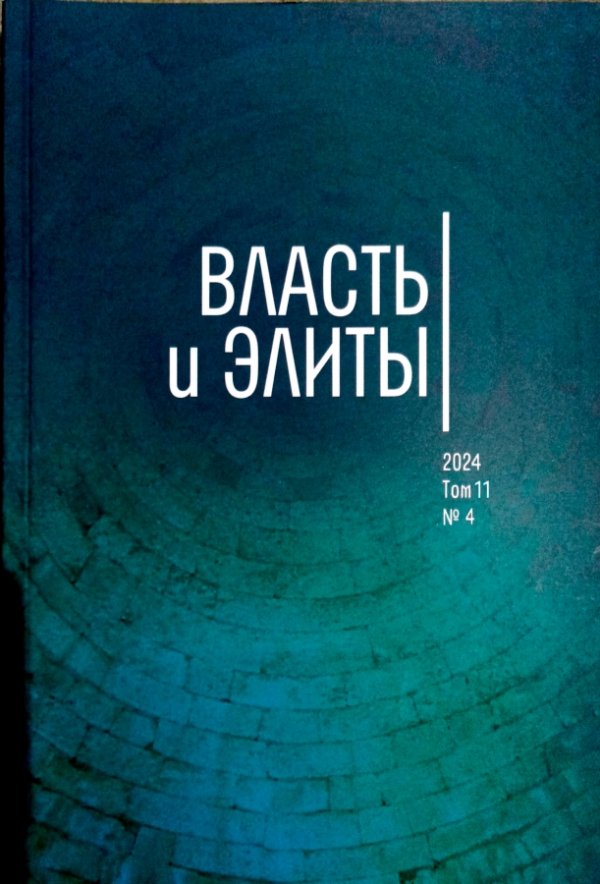Vol 11, No 4 (2024)
THE MECHANISMS AND PRACTICES OF POWER
Paradoxes of regional ethnopolitics in modern Russia
Abstract
The article examines some paradoxical features of regional ethnopolitics in modern Russia, which, according to the author, are explained by the fact that in modern Russia the ideological and institutional legacy of the Soviet national policy remains practically unchanged. This is primarily about the prevalence of the ethnocultural interpretation of the nation not only in society, but also in scientific and political discourse. Due to this, the political and intellectual elites of the “internal” Russian nations are very suspicious of the implementation of the goal declared in the “Strategy of the State National Policy of Russia until 2025” — the formation of a Russian civil nation, since they consider the processes of cultural assimilation as abnormal and dangerous for ethnic nations, and territory as a category of “national”, and in fact ethnic property. Based on the results of the study, the author formulates some recommendations regarding the necessary changes in the content of Russian ethnopolicy.
Power and Elites. 2024;11(4):27-44
 27-44
27-44


PROBLEMS OF THE ELITE STUDIES
Resource-dynamic self-organization model of local communities
Abstract
The problems of self-organization of modern local communities and the formation of spaces of their interested communication are analyzed. A model of self–organization implemented in the transit vector is proposed: resource — interest — self-organization — resource. In this regard, the possibilities of their capitalization and conversion are evaluated. Various resources and their political potencies are considered. Among the significant intangible resources, special attention is paid to specific social and symbolic resources. The author concludes that the dynamism of the model is associated with the realization of the resource potential of actors from individual to collective, from private to public, from functional to cross-functional and administrative. The platform of the current model of self-organization is largely the symbolic space of the market city and the priorities of the implementation of development strategies. On the one hand, abandoning them in harsh competitive conditions threatens the actor with the loss of all significant positions, the loss of his own political subjectivity. On the other hand, this model makes it possible to overcome competitive constraints, obtain preferences for the status of a political and administrative agent, and take advantage of systemic access to the creation and functioning of a political and administrative location regime with appropriate legitimate possibilities for disposing of an administrative resource (turbo-resource). Access to the turbo resource is of particular importance in the context of strengthening the unified system of public authority, reforming the existing system of local government, and personalized regional political regimes. In the context of considering the stages of political self–organization of communities, the features of the house of elites are considered — the unofficial basis of the political and administrative regime of the locality, represented by the elites of various functional spheres, united by the practices of beneficial exchanges and agreements and separated by a difference of interests. This field represents the core of the actual self-organization of communities and the formatting of the spaces of modern localities.
Power and Elites. 2024;11(4):7-26
 7-26
7-26


RUSSIAN REGIONAL ELITES
Crisis and stability in the mirror of the regional elite’s opinions (cases in-depth interviews)
Abstract
The article examines the opinions of the regional elite on the crisis and sustainability in modern Russia. Economic and political sustainability are important conditions for the state stability. Crisis factors violate the usual institutional orders and become a challenge for the ruling elite. The empirical basis of the study is the in-depth interviews with representatives of the regional / local political, administrative and economic elite. The sample included 8 regions of the North-West Federal District of the Russian Federation. The criteria of the positional approach were used to determine the status of the respondent. A qualitative analysis of the texts revealed differences in the perception of the crisis among representatives of two sub-elite groups. Age as a criterion also revealed differences in assessments / opinions and allowed us to divide all participants into two groups of «optimists» and «skeptics». The respondents — business representatives — evaluate the consequences of the crisis painfully and the elements of sustainability very critically. In the minds of people from regional and local administrations, the crisis phenomena of the last 5 years is not assessed as a serious threat that the system will not be able to cope with without significant losses. Sustainability indicators do not cause concern.
Power and Elites. 2024;11(4):138-159
 138-159
138-159


ELITE RECRUITMENT AND CAREER PATH
Governors and members of regional governments: career paths of senior executive officials of the Russian Federation subjects
Abstract
The publication contains research results from a study of high-ranking officials of executive power representing selected federal regions of the Russian Federation. It’s based on a comparison of the career paths of 794 biographies from biographic databases from 2015 and 2021 that cover high-level officials and administrative elites in the regions. The analysis included variables that characterize primary and professional socialization. We viewed the pre-elite career stage from the perspective of the recruitment pool. The analysis also encompassed variables like prior work experience in law enforcement agencies and previous administrative experience. We evaluated the speed of elite careers using the duration of appointments, as well as their level in hierarchy and fields of work. Overall, primary and professional socialization, as well as career paths of regional high-level officials, are almost identical to those of the administrative elite as a whole. However, some differences are discernible. For instance, the first elite-level appointment of r egional officials happens at a younger age. The key area of their pre-elite activities belongs to the political and administrative domains from which the recruitment mostly takes place. This tendency is also characteristic of the administrative elite as a whole. Law enforcement and military backgrounds are not significant in forming the recruitment pool, even though the share of top-level administrators with such backgrounds had grown from 11 % in 2015 to 30 % in 2021. Top-level administrators, along with the majority of the administrative corps, are pursuing their careers within a regional context. Federal-level appointments are rare. Both the regional and municipal levels hold minimal significance. Renewal of the top-level administrators goes slower than in the administrative elite as a whole. We view regional differences in career paths from the perspective of the Russian Federation’s ongoing re-centralization since 2000. The country remains a multi-level political system. There are still differences between regions when it comes to political opportunities, the formation of administrative elites and groups of top-level administrators, and career paths.
Power and Elites. 2024;11(4):45-100
 45-100
45-100


Cardinals of Europe and Africa: comparative analysis of the Catholic elite careers
Abstract
The article is intended to close the gap in the scientific literature on religious elites, associated with a lack of attention to the “Vatican bureaucracy” and a small number of comparative studies. The article offers an analysis of the biographies of European and African cardinals who are labeled as the Catholic elite according to the positional method. Geographic regions are selected based on the principle of least similarity. The career of cardinals is presented as a promotion through the church hierarchy, where the pre-elite stage is considered to be from ordination a priest to receiving episcopal ordination. The empirical basis of the study is data being gathered from the official website of the Holy See and processed in SPSS. The sample is equal to the general population and includes biographies of 137 hierarchs. The theoretical framework of the study is José Casanova’s concept of global Catholicism and Pierre Bourdieu’s sociology of religion. The analysis revealed that the careers of the Catholic elite of Europe and Africa, despite the presence of similar parameters, differ considerably. The rise of Europeans up the career ladder is accompanied by a decrease in endogeneity, understood as the coincidence of place of birth and work. This is due to the move to Rome, where dominant positions are concentrated and the “rules of the game” of the religious field are set. On the contrary, among Africans the type of career in which the prelate alternately occupies diocesan positions predominates. In the pre-cardinalate stage, African hierarchs are given leadership positions at the national level. This is due to the need to accumulate religious capital, which is not completed by the church in the African context. A comparative analysis of the biographies of the Catholic elite confirmed the hypothesis that regional differences have a significant impact on the careers of cardinals.
Power and Elites. 2024;11(4):101-137
 101-137
101-137












